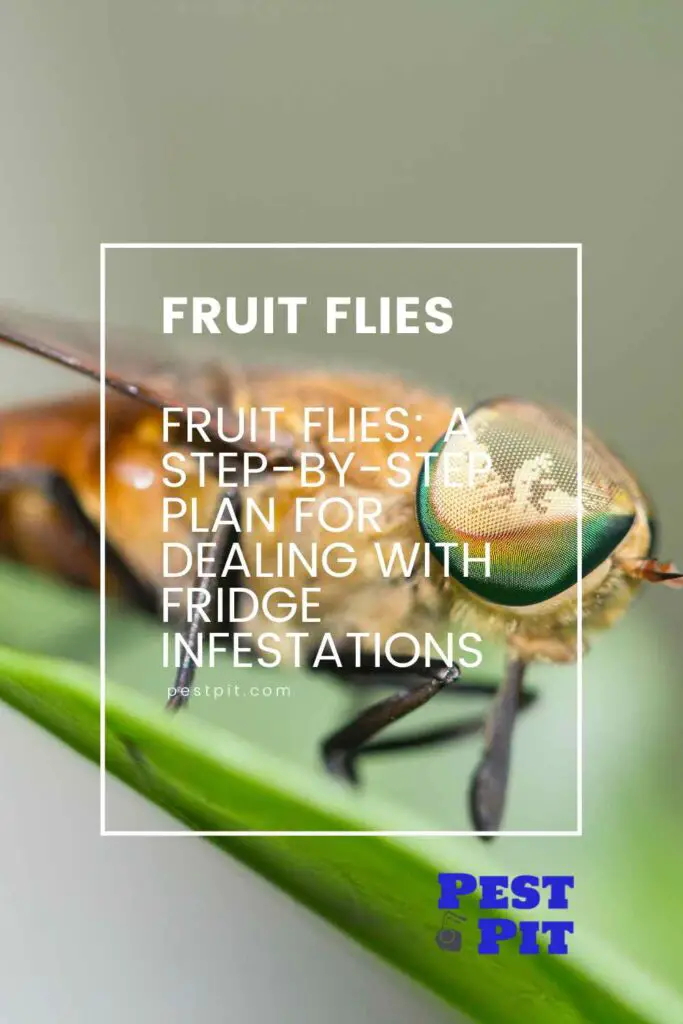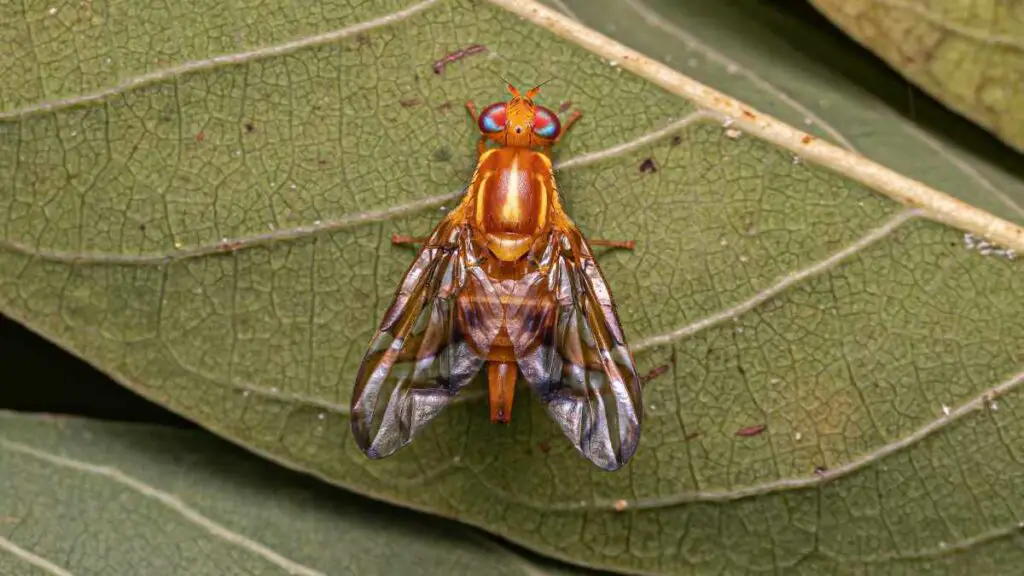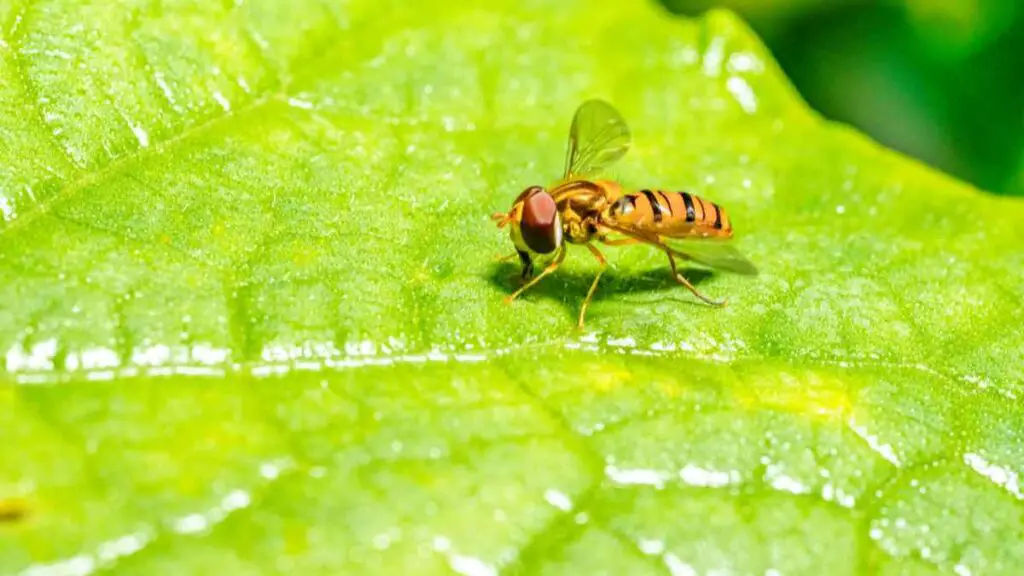Even though fruit flies are not as bothersome as other flies, seeing them buzzing around in your refrigerator is still annoying.
Moreover, these insects can contaminate your food items and cause your food items to spoil quickly.
If you’re looking for a step-by-step guide on how to deal with fruit flies in your refrigerator, then look no further.
This article helps you understand why and how fruit flies infest your fridge. It also gives you ways to eliminate them and prevent future infestation.

Understanding Fruit Flies: Why Fruit Flies Infest Your Fridge

To successfully eliminate fruit flies in your fridge, you must understand their habits and what attracts them to your refrigerator.
Let’s begin with what attracts them. Fruit flies are typically attracted to ripe, sweet-scented fruits (and any decaying food item).
This is why you can usually find them around fruit baskets, sink drains, and (in this case) your refrigerator – from where they can enter the freezer through the vents.
So, if you have ripe fruits or decomposing food items in your fridge, there’s a higher chance that you’d find these tiny insects there.
While they can survive in a fridge, fruit flies cannot survive for long periods in a freezer. However, according to testimonies from several homeowners, fruit flies can sometimes hibernate in freezers.
In situations like these, you will likely find them motionless – looking dead. But, if they’re rereleased to warmth, they’ll come out of hibernation and start moving again.
Besides the apparent annoyance and discomfort that fruit flies buzzing in your refrigerator (or laying dead) causes, having these insects in your fridge poses some health risks and nuisances like:
Food Contamination: When fruit flies infest your fridge, they can contaminate the food by standing on it, laying eggs, or leaving feces and bacteria on your food items. Consuming food that has been contaminated like this can lead to health concerns or food-borne illnesses.
Furthermore, fruit flies can spread harmful bacteria such as Salmonella, E. coli, and Listeria. Consuming food with these bacteria exposes you to food poisoning or other infections.
Food Spoilage: When fruit flies feed on fruits and vegetables, they accelerate the spoilage process. They feed on the sugars and fermenting substances in the organic food items and cause them to spoil quickly.
Moreover, fruit flies release enzymes that decompose the organic substances they’re feeding on. These enzymes produced unpleasant odors in the fridge, making it unpleasant to use.
How do Fruit Flies enter your fridge?

Now, we answer the question: how do fruit flies enter my fridge? There are several ways through which these insects enter your refrigerator. Some of them include:
Through holes/leaks: Even though most refrigerators are designed to be airtight and sealed, they can have tiny openings from overtime usage, wear and tear, and improper maintenance.
Some openings that fruit flies can exploit include cracked and broken parts, improperly sealed vents, electrical cord gaps, cracks in interior surfaces, etc.
Open Fridge Doors: Another common route for fruit flies into your fridge is flying or crawling through fridge doors due to failing gaskets or openings.
Since they’re small and quick, fruit flies may crawl up or fly into your fridge once the fridge door is opened for a long time.
Hitchhiking with fruit/vegetables: Sometimes, fruit flies get attached to fruit and vegetables. So, when you put them in the fridge without washing them, you carry the fruit flies in with them.
Eggs in Unused Fridges: If you’re renting your fridge, the fruit flies may have been in the fridge walls while it was unused. Likewise, the flies may have laid eggs or breeding grounds in the refrigerator.
Step-by-Step Plan for Eliminating Fruit Flies

Eliminating fruit flies in the fridge should be done with utmost care. Why? Because most of the common solutions to insect infestation involve using toxic chemical products which, when used in your fridge, may lead to serious health problems.
That said, you can follow the following steps to get rid of fruit flies in your fridge:
Take out everything in the fridge and locate the breeding grounds or source of the infestation (I.e., what attracts them, e.g., poorly packaged food, expired food items, and veggies and fruits with questionable edibility.)
Remove the dead or hibernating insects and dispose of them properly before they reawaken and swarm your house. Gather all the dead, live, or hibernated insects and dispose of them far from your home.
Afterward, clean the fridge with an all-purpose cleaner and sponge or damp cloth. You should scrub away all the food remnants in your fridge and not leave the shelves and drawers unwashed, too.
You should carry out the cleaning process quickly to reduce the water you’ll have to collect as defrosting progresses.
This thorough cleaning process can also increase the efficiency of your fridge as it begins a defrosting process that removes ice buildup in your fridge.
Then, sanitize your fridge with a mixture of water and white vinegar. Avoid using toxic chemicals for sanitization since you keep food in your fridge.
After sanitizing, the next step is to deploy fly traps in the refrigerator. Make the fly traps by putting vinegar or cider in a small bottle and rubbing the neck (inside) of the bottle and its mouth with sticky dish soap.
The vinegar attracts them into the bottle, while the dish soap prevents them from leaving the bottle. Place the bottle in your fridge to ensure anyone left after cleaning is trapped, and use as many traps as you deem fit.
Another trap you can try is a paper funnel, a jar, and a fruit. First, you make a funnel (with an opening of 0.25-inch maximum) from regular paper. Afterward, set a ripe banana, tomato, or peach inside the jar and place the funnel so its opening is just above the fruit. Then, you can place the trap inside your fridge.
The fruit attracts the fruit flies through the funnel, but they won’t be able to get out of the jar again. Then, you can dispose of them as you wish.
If your fruit flies infestation persists after these steps, you have two options. One, you call a professional pest controller to inspect your fridge (and the house). Or you can get a new fridge.
Additional Tips and Best Practices for a pest-free refrigerator
After eliminating these least from your fridge, you should adopt the following measures/practices to maintain a pest-free refrigerator:
Wash your fruit and veggies (and any organic food item) thoroughly under the sink before putting them in your fridge. This helps eliminate insects (seen or unseen) on the food items.
Ensure fridge door gaskets are in good condition and keep fridge doors closed always. This reduces the chances of the fruit flies flying or crawling into your fridge.
Store food in a covered container before putting it in a fridge. If your food items are put away safely in airtight containers, it’ll reduce your fridge’s attraction for fruit flies. And in case of an infestation, it’ll protect your food items from contamination.
Maintain proper sanitation by cleaning your fridge frequently. Cleaning your fridge regularly is not only hygienic but also makes it less appealing for fruit flies, as all food residues and other things that attract them are washed out as soon as possible.
Lastly, keep your fridge as cold as possible. This is not a fail-proof method to keep fruit flies out of your fridge. But, since fruit flies usually don’t survive freezing temperatures, keeping your fridge cold can help kill off those that enter your fridge. Alternatively, it may force them into hibernation. After which, you can gather and dispose of them properly.
Good luck!

